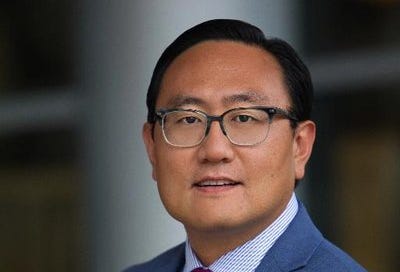Disrupting prior auth with Steve Kim, MD 9/13/22
Toward ZERO friction from prior auth by 2025 🚀
It was a terrific Twitter Spaces chat with Steve Kim, MD today. I have to start by confessing that I bumbled the tech side and didn’t notice we weren’t recording until we finished. So, instead of a replay, you’re stuck with my notes.
Here we go.
Steve is a urologist who has been working on a tech solution to prior authorization for 10 years. He’s gone deep into understanding the problem (I don’t know anyone who’s gone deeper). A few issues rose to the top. There is no transparency of the prior auth process. From one payer to the next it can be completely different, often requiring multiple paper forms, and still often using faxes instead of digital communication. It’s essentially a black box. Steve’s company, Voluware, is working on digitizing and making transparent the process. They’ve worked through and continue to maintain thousands of paper forms to be able to do what they do. When his system works, they can take a process that would take a physician 20 minutes and shave it down to 1 minute. That’s compelling.
There is still a long way to go, and some pretty significant barriers. There is no shared language between EHR systems, not to mention payer systems. One major thing that’s missing is “semantic interoperability”. And, a huge reason it doesn’t exist is that the systems involved don’t have enough incentive to solve this problem. My dumbed-down analogy was that it’s like the world agreeing that all cell phones should charge with USB-C. It would make things better for everyone if we agree on these critically important communication standards. Instead, we have corporations with little incentive to make this better. Data standards like HL7/FHIR are meant to be part of the solution but don’t do nearly enough. Please make yourself familiar with the words semantic interoperability, because it’s something we should all be demanding.
Steve and I agree that we need to think of health information technology as a public good. This is an important paradigm shift. As long as we allow private companies to keep our data in silos and play monopoly for the most profit, it’s going to be an uphill struggle to solve many of our most pressing healthcare tech problems. This includes prior auth and fixing the very broken EHR. It’s time for the US to consider investing in such infrastructure using open standards like OpenEHR. Imagine if the internet was entirely owned and controlled by several giant tech companies who could decide what apps you are allowed to download and use, which ones could talk to each other, and how. Big tech has too much control as it is. While the internet has its own problems, it is exponentially better than health IT when it comes to open communication. Such a shift to health data infrastructure as a shared public utility is a dream of mine that I know could unlock tremendous disruptive innovation. We desperately need it.
We had some good discussion about the Seniors’ Timely Access to Care Act. The consensus from the group on the chat is that this act is a positive move, although it doesn’t do nearly enough. At this point, it hasn’t passed the House yet. We are in close contact with our friends at the American College of Physicians (ACP) to consider how this ties into our best call to action with our October 3 panel on disrupting prior auth. What is our most important near-term win that we should come together to fight for? We’re working on this. Stay tuned.
Finally, (and this is what I love about social audio) we were joined by Erica Bersin who has worked for 25 years in health communications. She left us all with a challenge that weighs on me greatly. She believes that it’s our moral duty as physicians to come together to demand universal healthcare as a country. I happen to agree with her. We talked about why Medicine Forward chose to start with prior authorization. We needed a winnable problem that is an important symbolic symptom of our broken system. ZERO friction for patients and physicians from prior authorization by 2025 continues to be our goal. And, she is so right. We need to keep reaching for a much bigger dream.
Apologies again for promising a recording that didn’t work out. We’re just going to have to do this again. These conversations are fun and I’m looking forward to doing more. Please join in. I want to hear your voice.
Onward!
Gabe




Awesome notes thanks for including us! Compelling story indeed and the challenge of physicians coming together to demand something Universal Healthcare makes me feel excited to be part of this conversation. Looking forward to your next chat and will find you on Twitter.